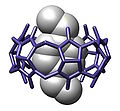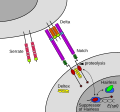In chemistry, a non-covalent interaction differs from a covalent bond in that it does not involve the sharing of electrons, but rather involves more dispersed...
27 KB (3,311 words) - 13:54, 24 February 2025
π-effects or π-interactions are a type of non-covalent interaction that involves π systems. Just like in an electrostatic interaction where a region of...
8 KB (968 words) - 13:24, 18 February 2025
The Non-Covalent Interactions index, commonly referred to as simply Non-Covalent Interactions (NCI) is a visualization index based in the Electron density...
4 KB (578 words) - 11:36, 24 August 2023
Intermolecular force (redirect from Dipole-dipole interaction)
visualize this kind of intermolecular interactions, that we can find in quantum chemistry, is the non-covalent interaction index, which is based on the electron...
28 KB (3,468 words) - 17:17, 23 February 2025
Host–guest chemistry (redirect from Host–guest interaction)
full covalent bonds. Host–guest chemistry encompasses the idea of molecular recognition and interactions through non-covalent bonding. Non-covalent bonding...
45 KB (5,110 words) - 18:06, 9 January 2025
Mechanically interlocked molecular architectures (section Mechanical bonding effects on non-covalent interactions)
increased and the strength of non-covalent interactions between the components are altered. The strength of non-covalent interactions in a mechanically interlocked...
12 KB (1,315 words) - 15:57, 31 December 2024
Supramolecular chemistry (redirect from Supramolecular interaction)
chemistry concentrates on the covalent bond, supramolecular chemistry examines the weaker and reversible non-covalent interactions between molecules. These...
35 KB (3,830 words) - 14:53, 7 April 2025
Chemical polarity (redirect from Non-polar covalent bond)
nonpolar covalent bonds and non-bonding pairs of electrons known as a full molecular orbital. While the molecules can be described as "polar covalent", "nonpolar...
24 KB (2,763 words) - 01:53, 11 December 2024
water and the metal cation is described as a coordinate covalent bond. Metal-ligand interactions in most organometallic compounds and most coordination...
10 KB (1,313 words) - 13:10, 8 April 2025
Initially, the interaction between the active site and the substrate is non-covalent and transient. There are four important types of interaction that hold...
41 KB (4,859 words) - 12:14, 25 March 2025
Protein–ligand complex (section Interactions)
reversible non-covalent interaction between two biological (macro)molecules. In non-covalent interactions there is no sharing of electrons like in covalent interactions...
11 KB (1,297 words) - 07:08, 20 January 2024
In chemistry, a pnictogen bond (PnB) is a non-covalent interaction, occurring where there is a net attractive force between an electrophilic region on...
8 KB (897 words) - 11:47, 19 March 2025
In chemistry, a salt bridge is a combination of two non-covalent interactions: hydrogen bonding and ionic bonding (Figure 1). Ion pairing is one of the...
21 KB (2,523 words) - 09:39, 31 March 2025
Molecular imprinting (section Non-covalent)
functional groups into imprinted cavities through non-covalent interactions, thus leading to non-covalent imprinting. Many approaches regarding molecular...
19 KB (2,212 words) - 16:58, 26 October 2024
organic chemistry, covalent bonding is much more common than ionic bonding. Covalent bonding also includes many kinds of interactions, including σ-bonding...
29 KB (3,846 words) - 22:53, 13 April 2025
the binding of biotin to streptavidin is one of the strongest non-covalent interactions known in nature. Streptavidin is used extensively in molecular...
20 KB (2,488 words) - 12:49, 11 March 2025
spatial conformations driven by a number of non-covalent interactions, such as hydrogen bonding, ionic interactions, Van der Waals forces, and hydrophobic...
38 KB (4,246 words) - 13:59, 17 January 2025
stabilized by non-covalent interactions and disulfide bonds between two cysteine residues. The non-covalent interactions include ionic interactions and weak...
24 KB (2,885 words) - 02:45, 28 March 2024
states, and products of chemical reactions, and non-covalent aspects of solvation and molecular interactions that influence chemical reactivity. Such studies...
50 KB (5,561 words) - 12:59, 11 June 2024
Chromatography (redirect from Hydrophobic Interaction Chromatography)
temperature and pressure. Affinity chromatography is based on selective non-covalent interaction between an analyte and specific molecules. It is very specific...
58 KB (7,243 words) - 02:30, 9 February 2025
reversible process where NSAIs binds to the aromatase enzyme through non-covalent interactions. When aromatase inhibitors (AIs) are used to treat breast cancer...
31 KB (3,675 words) - 04:23, 27 September 2023
non-covalent interactions between its protein odorant receptor (found in the nasal epithelium), such as electrostatic and Van der Waals interactions as...
32 KB (3,856 words) - 15:20, 25 February 2025
and non-covalent interactions. M08-SO: Global hybrid functional with 56.79% HF exchange. Intended for main group thermochemistry, kinetics and non-covalent...
26 KB (2,504 words) - 16:04, 26 June 2024
directional secondary interactions–that is, non-covalent bonds. These non-covalent interactions include van der Waals interactions, hydrogen bonding, Coulomb...
49 KB (5,691 words) - 17:58, 2 February 2025
Notch signaling pathway (section Ligand interactions)
extracellular portion, which associates in a calcium-dependent, non-covalent interaction with a smaller piece of the notch protein composed of a short extracellular...
95 KB (11,032 words) - 23:25, 20 February 2025
ionic mobility and/or partitioning into an alternate phase via non-covalent interactions. Additionally, analytes may be concentrated or "focused" by means...
36 KB (4,675 words) - 21:03, 7 June 2024
intermolecular interaction energy has been given: Chemistry portal Biology portal Dispersion (chemistry) van der Waals force van der Waals molecule Non-covalent interactions...
13 KB (1,615 words) - 12:38, 8 March 2025
hydrogen bonds and salt bridges. Similar to these other non-covalent bonds, cation–π interactions play an important role in nature, particularly in protein...
35 KB (4,104 words) - 14:03, 23 August 2024
like hydrogen and halogen bonds, have been invoked in various non-covalent interactions, such as protein folding, crystal engineering, self-assembly,...
14 KB (1,692 words) - 15:14, 24 February 2025

















